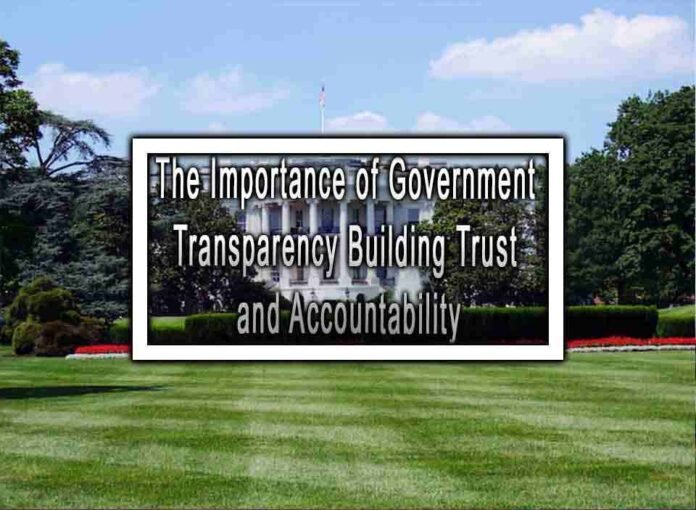Government transparency plays a crucial role in building trust and fostering accountability within a society. When a government operates transparently, it means that its actions, decisions, and processes are open and accessible to the public. Here are some key reasons why government transparency is essential:
1. Trust in Government:
Transparency enhances citizens’ trust in their government. When people have access to accurate and timely information about government activities, they are more likely to believe that their leaders are acting in the public’s best interest. This trust is fundamental for a stable and functioning democracy.
2. Accountability:
Transparency enables citizens to hold their government officials accountable for their actions. When government activities are open to scrutiny, it becomes more challenging for officials to engage in corruption, abuse of power, or unethical behavior without consequences.

3. Effective Decision-Making:
Transparent governments make informed decisions based on data and public input. When citizens have access to information, they can participate in the decision-making process, providing valuable insights and helping policymakers address their needs.
4. Reduced Corruption:
Transparency is a powerful tool against corruption. When government operations are visible, it becomes harder for officials to engage in bribery, embezzlement, or other corrupt practices without being exposed.
5. Public Participation:
Transparency encourages public engagement and participation in governance. When citizens can access information about government policies and initiatives, they are more likely to get involved, share their ideas, and contribute to the democratic process.
6. Improved Service Delivery:
Transparent governments are more accountable for the delivery of public services. When the public can monitor and assess the performance of government agencies, it incentivizes efficiency and quality in service delivery.
7. Investor Confidence:
Transparency attracts both domestic and foreign investors. When investors can access reliable information about a country’s economic and political climate, they are more likely to make informed investment decisions.
8. Social Cohesion:
Transparent governance fosters social cohesion by promoting inclusivity and reducing information disparities. When all citizens have equal access to information, it strengthens the sense of belonging and citizenship within a society.
9. Innovation and Progress:
Open access to government data can drive innovation and research. Researchers, academics, and entrepreneurs can use government data to identify societal challenges, develop solutions, and contribute to social progress.
10. Legitimacy and Legality:
Transparency ensures that government actions are legal and legitimate. When government decisions are made openly and with adherence to the rule of law, it reinforces the government’s authority and legitimacy in the eyes of the public.
In summary, government transparency is vital for a healthy and functioning democracy. It empowers citizens, promotes accountability, and strengthens the relationship between the government and the people it serves. By embracing transparency, governments can build trust, enhance their credibility, and work towards the betterment of society as a whole.











